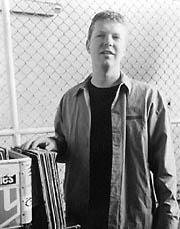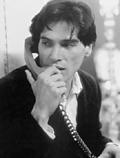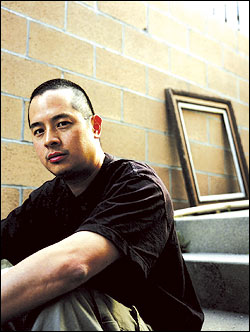THE CORN ALERT inevitably sounds with the phrase “Let’s put on a show!” whether in life or at the movies. There, the specters of Mickey Rooney and Judy Garland have forever established a subsitcom alternate reality that most serious filmgoers simply can’t stand. And with good reason.
GROOVE
directed by Greg Harrison
with Lola Glaudini, Hamish Linklater, Denny Kirkwood, and DJ John Digweed
opens June 16 at Neptune
Take the new Groove, a rave-culture flick set in the dance music mecca of San Francisco that in form bears a resemblance to those deathless movie musical classics, complete with updated stereotypes and clich鳮 There’s David (Hamish Linklater), the uptight guy who has his outlook altered via his first ecstasy trip. There’s Leyla (Lola Glaudini), the tough girl searching for meaning through constant partying. There’s David’s brother Colin (Denny Kirkwood) and his naﶥ young girlfriend, Harmony (Mackenzie Firgens), whose relationship is going too far too fast. And so on. Of course, this wouldn’t be a “let’s put on a show!” flick without pulling out some of the corniest stops in the book. In this case, British DJ John Digweed shows up to play at our heroes’ tiny warehouse party, gratis—even though Digweed, a regular European superclub headliner, typically makes several thousand dollars a gig. (The ravers we see are so ecstatic at Digweed’s sunrise set that—you guessed it—we see them throwing their hands in the air in slow motion.)
Sounds stupid, right? Well, it pretty much is. But Groove‘s effectiveness comes not from its text but from its feel. Writer-director Greg Harrison is a longtime San Francisco raver himself, and he effortlessly transfers his knowledge of and love for that scene onto film. As a result, Groove seems less like a movie about a rave than a movie that happens to be taking place in the middle of one, complete with hackneyed script, depthless characters, and stiff acting. (Only Glaudini, of NYPD Blue, suggests much personality beyond her lines.) That’s not to mention a fine soundtrack of stuff most filmgoers—and not a few clubbers—will be only vaguely familiar with.
Groove‘s success has something to do with the nature of raving itself. Substitute “warehouse” for “barn” (or don’t, as someone who’s partied among plenty of hay bales can tell you), and you have a culture that follows the Rooney-Garland formula to a tee, complete with openhearted character transformations. I rolled my eyes a lot during Groove. But even then I was itching to find out where the next party was.








